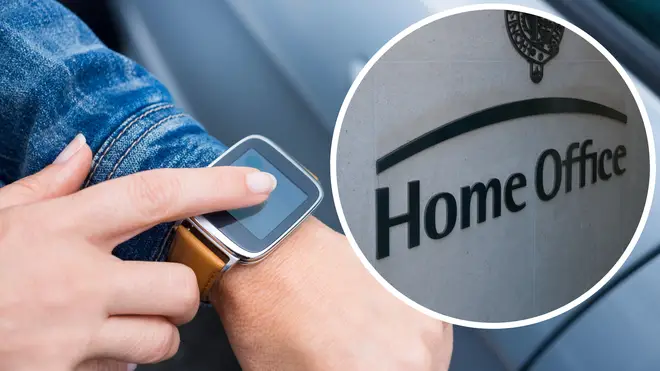
Richard Spurr 1am - 4am
5 August 2022, 12:50

Migrants convicted of criminal offences will need to use smartwatches installed with facial recognition to scan their faces up to five times a day under new government plans.
The scheme, set to be introduced across the UK from autumn, will require individuals "subject to immigration control" to be monitored daily with either an ankle tag or a smartwatch.
The individuals will need to take photos of themselves on their smartwatch throughout the day and their locations will be tracked 24/7, according to The Guardian.
The images will then be checked against biometric facial images on the Home Office systems.
Read more: Keir Starmer breached code of conduct after failing to register football and food festival tickets
Read more: What the Bank of England's interest rate hike could mean for you and your money
A manual check will be performed if the verification fails.
The individual's name, date of birth, nationality and photographs will be stored for up to six years.
The Guardian reports the scheme will initially cost the government £6m.
LBC has approached the Home Office for a comment.

'Fire Priti Patel in 3 seconds,' says Home Office worker
The data will be shared with the Home Office, the Ministry of Justice and the police.
The Home Office said the sharing of similar data with police "is not new".
But campaigners have hit out at the plans, saying 24-hour surveillance is a breach of human rights.
"Facial recognition is known to be an imperfect and dangerous technology that tends to discriminate against people of colour and marginalised communities," Lucie Audibert, a lawyer and legal officer for Privacy International, told The Guardian.
Read more: Tory leadership vote delayed by 'hacking fears'
Read more: Grant Shapps threatens prison to Just Stop Oil protesters who block M25
She added that such "dehumanising" schemes are "driven by private companies who profit from governments' race towards total surveillance".
Dr Monish Bhatia, a lecturer in criminology at Birkbeck, University of London, said the monitoring was "intrusive" and would have a detrimental impact on individuals' mental health.
She added the Home Office had not provided any evidence for why the scheme was necessary.